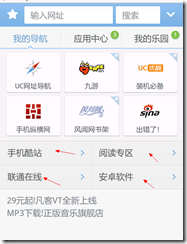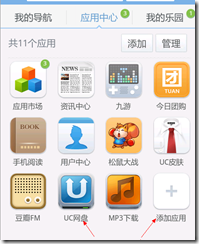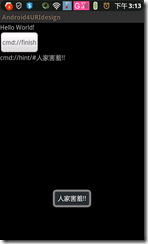[转载]android ->在界面上使用URI编程 —-开发笔记1 – youxiachai – 博客园.
导言
做Android 开发有一段时间了,很多时候就是做些重复性的数据绑定,还有就是不够操作不够灵活,例如,我在某个界面要新增一个按钮,就需要发布一个新版本,就这么一个 按钮的话其实,可以完全由服务器控制,例如UC,凡客他们要更新首页,不可能为了更新一个首页特地开发一个新版本,那多傻啊,所以,观察了一下,想出了一 个可能解决的方案…
1.控制显示
如何做到有服务器控制客户端的显示呢?
我们可以在客户端预留一些可能会用的例如UC的首页:
箭头标志的区域,是会根据不同情况而更新,而我现在就是要做出这样的效果.
如何控制显示?
我们知道,Android 找view是通过一系列ID 值找到相关的UI 那样,我们可以通过,在服务端,发送我们要修改的id.
1,是直接发送ID值还是发送一个具体路径?
这点,我毫无犹豫的选择了发送一个ui的路径,通过在客户端把这个URI进行转义,然后获得,相关的ID值.代码
/** * 资源ID 的几种形式 * res = package:type/entry * 1,res://com.achai@drawable/test_icon * 2,res://drawable/test_icon *(1) 不带具体包名 *entry = layout/main *(2) 指定包名和类型实体 *com.achai@drawable/icon * @param url * @return */ public static int getResIdFromURL(String url){ URI uri = URI.create(url); String scheme = uri.getScheme(); String type = uri.getHost(); String entry = uri.getPath(); entry = entry.replaceFirst("/", ""); String packageName = uri.getUserInfo(); if(ress == null) initRes(); if(ress == null) return -1; //判断是否android资源URL if(!scheme.equals("res")) return -1; //1,判断是否是带包名的uri,并执行转换,获得资源ID if(packageName != null){ return ress.getIdentifier(entry, type, packageName); }else{ return ress.getIdentifier(entry, type, defPackage); } }
思路就如同代码那样,这样,我们的客户端就能够解析服务端发送过来要改哪个UI的了!接着就是修改值的事情了,这部分,以后继续!
2,控制监听
还是用uc作为例子:
在 UC的应用中心中,有个添加应用,这里就有个问题,我们如何监听我们新增的应用呢?
x
我翻阅android api的时候发现这么一行话
Tags
Unlike IDs, tags are not used to identify views. Tags are essentially an extra piece of information that can be associated with a view. They are most often used as a convenience to store data related to views in the views themselves rather than by putting them in a separate structure.
看到这里,我觉得就可以在这里做点文章了.
我们可以做一个tag 命令系统,然后,在这些新增应用的tag上打上一个标签命令,例如,UC就可能在这些应用上的tag 打上一个url 我们点击的时候,就会跳转到相关的应用.
根据这个思路敲下如下代码
public void doViewClicked(View v){ String url = v.getTag().toString().trim(); if(v != null && url != null){ //对view 中tag 进行解析 doExecUrl(v, url); } } protected void doExecUrl(View view, String url) { try{ if(url.indexOf('\n') > 0){ String[] urls = url.split("\n"); for(String u : urls){ execUrl(view, u); } }else{ execUrl(view, url); } }catch(RuntimeException ex){ UserApp.curApp().showMessage("url 解析错误"); } } private void execUrl(View view, String u) { URI execUri = URI.create(u); if(execUri == null) return; String prefix = execUri.getScheme(); //执行相关的的命令 if(prefix.equals("cmd")){ execCmd(execUri); }else if(prefix.equals("act")){ execAct(execUri); } } /** * 执行命令操作 * @param u */ private void execCmd(URI u){ String type = u.getHost(); //监控 watch if(type.equals("watch")){ //用于观察view 中的变量改变情况,晚些在实现 return; } //结束当前view if(type.equals("finish")){ theAct.finish(); return; } //弹出提示 if(type.equals("hint")){ String msg = u.getFragment(); if(msg != null){ UserApp.showMessage(theAct, msg); } return; } //重新读取 if(type.equals("reload")){ return; } //设置指定id view 的值 if(type.equals("setview")){ return; } //设置显示某个view if(type.equals("showview")){ return; } }
这样,我们可以在初始化view的时候,遍历所有view的元素,有tag命令就设置监听器!
public void checkView(){ ViewGroup vg = (ViewGroup) findViewById(R.id.line); int count = vg.getChildCount(); for(int i=0; i < count; i ++){ View child = vg.getChildAt(i); String tag = (String) child.getTag(); if(tag != null){ initTagCmd.setViewTagListenr(child); } } }
这样我们就可以很灵活的操作我们的UI 事件了!
k
可能有人会说效率问题?
效率的影响那是肯定会有的,但是,你想一下,一个view 官方推荐不要超过80个,一般而言也就10来个,遍历消耗的时间估计就算是htc g1(第一台android手机)那样的配置的手机都没问题,更何况是现在4核的android手机….
试一下效果:
这是一个开源的玩意…
这个项目放在了github上,如果有朋友,想试一下可以到以下链接下载或者关注,提供一些建议,完善的话会慢慢来…
 Mikel
Mikel




